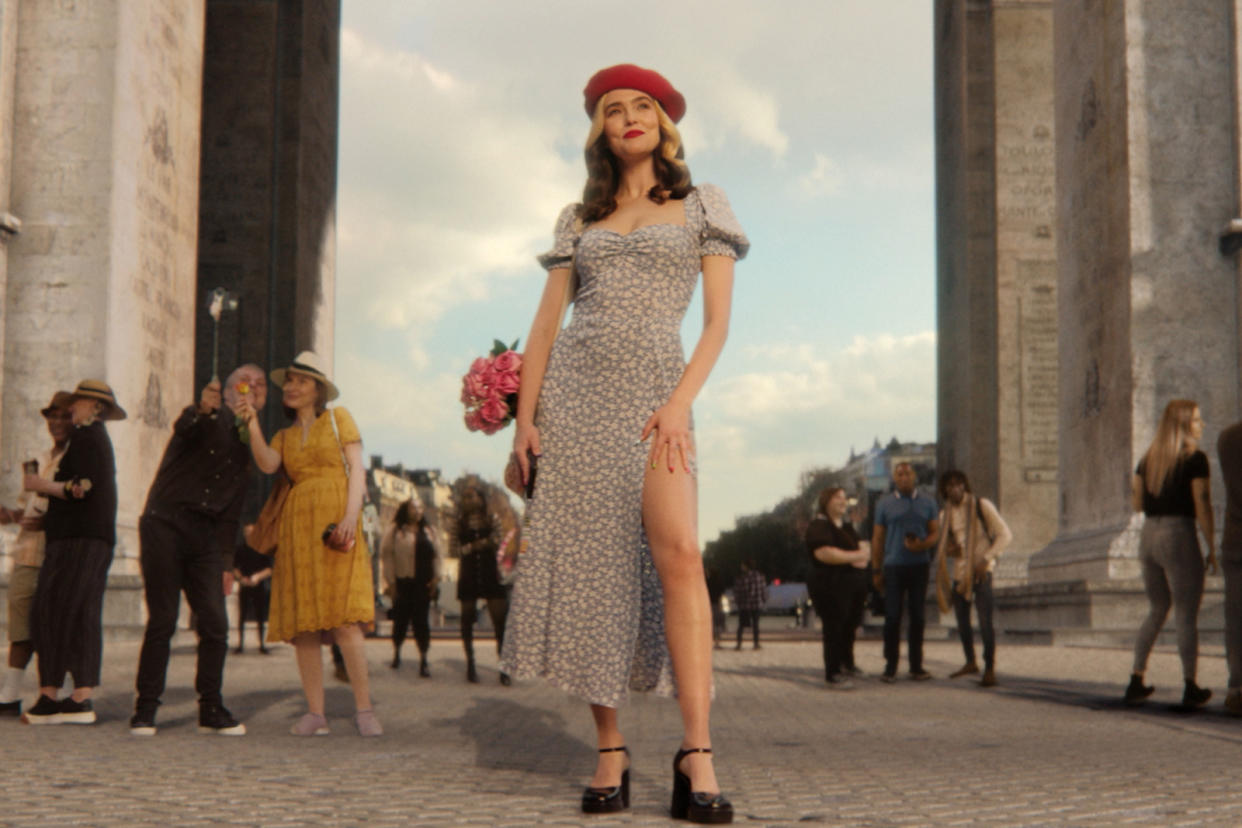‘Not Okay’ Gives Us an Anti-Heroine for Our Age of Perpetual Internet Thirst

- Oops!Something went wrong.Please try again later.
- Oops!Something went wrong.Please try again later.
Not Okay wastes no time telling us that its central character, a vapid Insta-famous charlatan named Danni Sanders (Zoey Deutch), is a bad person. Like, not a single second: Before the movie has even begun, a disclaimer pops up that warns of “flashing lights, themes of trauma, and an unlikable female protagonist.” Is that last bit simply pure cheekiness on the part of writer-director Quinn Shephard (Blame), or just a cautious way to kick off a cautionary comedy about a liar who incurs the outrage of social media? You can never be too careful in an age when representation is readily confused for endorsement. (Just ask Martin Scorsese after a half-century of refusing to explicitly tag his own unlikeable protagonists as such.)
The real question is: What makes Danni so unlikable? We first meet her after she’s gone full milkshake duck, through a montage of internet shaming — including the rant of one YouTube pundit who compares her unfavorably to Hitler — that reveals where her story is headed but not how it will get there. Flashing back to the days before our main character was the main character on Twitter, the movie reintroduces Danni as a young nobody at a hip, Vice-like website called Depravity, getting chewed out by her boss for publishing a story about — unlikeable protagonist alert! — feeling FOMO for having missed 9/11. “Can’t tone deaf be a brand?” she wonders aloud.
More from Rolling Stone
'Flux Gourmet' Is One F-cked-Up, Four Course Meal of Gastro-Horror
'Irma Vep' Isn't a Remake -- It's a Remix for Our Apocalyptic Age of Endless Streamable I.P.
'RRR' Is the Best -- and Most Revolutionary -- Blockbuster of 2022
Desperate for cachet and to impress her crush, a perpetually vaping influencer (Dylan O’Brien) who works at her office, Danni invents a writer’s retreat in Paris, photoshopping her face into fake selfies in front of the Eiffel Tower while laying low in her New York apartment. It’s an act of subterfuge for Instagram clout that grows considerably more complicated when her posted images seem to place her in the vicinity of a devastating terrorist attack on the City of Light. Rather than come clean, Danni leans into the lie. Suddenly, she’s the center of attention, lavished with sympathy, respect, and plum bylines centered around the illusion that she was at the wrong place at the wrong time.
As comedy, Not Okay can be awfully broad. Its opening half hour is open season on easy targets, with Danni as merely the most clueless of the film’s millennial caricatures, spouting unironic lingo-dialogue like “We stan a fearless queen.” Shephard’s slyest gag here is that Danni barely has to put an iota of effort into protecting her astronomical lie. Almost no one questions how completely unfazed she seems, because hey, everyone deals with trauma in different ways, right? She’s the same old shallow, self-centered Danni, but with a protective shield of unearned reverence around her.
She is not, however, without conscience. It rears its head in the form of cheesy, horror-movie flashes of the Paris bomber, blipping into crowds like a hooded phantom of her guilt and shame. The pot is stirred even further with the introduction of a foil: Rowan (Mia Isaac), the teenage school-shooting survivor Danni befriends after crashing a support group, Tyler Durden-style, in search of material for her article on the attack. Rowan has, of course, faced real hardship — not just as someone actually grappling with PTSD and loss, but also as a young woman of color who’s made herself a public target by campaigning for gun-control laws. With her entrance, the film takes a turn for earnestness, and while the drama is a welcome alternative to the movie’s more glib stabs at generational critique, it also suggests certain skittish limits to what Shephard is willing to play for even pointed laughs.
Thankfully, Not Okay is too savvy to become an outright redemption story. We know comeuppance awaits Danni; it’s the foregone conclusion on which the movie opens, promising eventual exposure and reckoning. And Shephard knows, too, that part of the whole cycle of internet fame is the insincere apology tour, where attempts at image rehabilitation become just another form of spotlight monopolization. To the extent that the film reaches for uplift, it’s largely at the expense of its heroine, via a big, assembly-hall speech that puts her on blast. Though there’s definitely a sliver of irony in the way this wobbly slab of social commentary savages the co-opting of other people’s trauma while essentially fictionalizing the struggle of the Parkland kids into a rousing, Instagram-quotable climax. (One assumes, at least, that arranging a cameo for Caroline Calloway counts as intentional irony.)
In the end, it’s not just that you’re watching a satire sans teeth — it’s more like you’re sitting through a version of Shattered Glass where Stephen Glass feels kind of bad about all those stories he made up. Deutch is an actor apparently incapable of totally suppressing the down-to-Earth charm she brought, most winningly, to Everybody Wants Some! Here, she keeps suggesting hints of an essentially decent person bubbling to the surface of her character’s atomic selfishness. It’s a choice that’s dramatically convenient, but doesn’t entirely square with the conception of Danni as someone willing to commit to a lie this massive and insensitive. Sardonic or not, the content warning is misleading: Danni just isn’t that unlikable, even as she behaves in a way that makes Evan Hansen look like a paradigm of honesty.
Best of Rolling Stone

